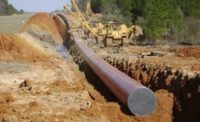Energy Construction
Court Orders Redo of Suit Against $246M NJ Gas Compressor Project

Opponents of a proposed $246-million compressor station on an existing Tennessee Gas Pipeline Co. line must include the company in its appeal of the project’s exemption from a state environmental law, the New Jersey Supreme Court said April 11.
Sierra Club, Food & Water Watch and the New Jersey Highlands Coalition filed a lawsuit against the New Jersey Dept. of Environmental Protection for exempting the pipeline company, a unit of Kinder Morgan, from the requirements of a state law, the Highlands Water Protection and Planning Act, protecting an area in northern New Jersey.
Tennessee Gas filed a motion to intervene, which a lower court had denied.
The lawsuit was filed against the state agency that granted the exemption, because such actions are limited to regulated public utilities, Jeff Tittel, former executive direction of the Sierra Club’s New Jersey chapter, told ENR. “An interstate gas pipeline is not a utility. The state had no right to grant the exemption,” he says.
Tennessee Gas argued that it has an “undisputed economic interest” in the appeal because any decision that set aside the project’s exemption would potentially delay the construction and affect its ability to meet its contractual obligations.
The project includes a 19,000-hp electric compressor turbine and upgrades to two existing compressor stations but will not include any new pipeline construction, according to Kinder Morgan. The proposed site for the new compressor station is a previously disturbed industrial parcel, formerly used as a quarry and other industrial and commercial purposes, the company said.
The upgrades will increase natural gas capacity on the existing pipeline system by 115,000 dekatherms per day to meet the specified market need of New York state utility Consolidated Edison.
It also will help eliminate capacity constraints in the region, especially during periods of peak demand, said Kinder Morgan, which filed for project approval by the Federal Energy Regulatory Commission in 2020.
In another pipeline dispute, FERC on April 8 approved a request by the developer of the $6-billion Mountain Valley Pipeline to change its construction method to cross 120 water bodies along a 70-mile route by using tunneling rather than open cut. The move amends the company’s permit issued in 2017.
The project still must obtain a water crossing permit from the U.S. Army Corps of Engineers and approvals from U.S. Fish and Wildlife Service, the U.S. Forest Service and the Bureau of Land Management.
The 303-mile project, which is nearly completed, would transport fracked gas from the Marcellus Shale in northern West Virginia to southern Virginia.
“Mountain Valley's usage of trenchless waterbody crossings will result in fewer environmental impacts than the crossing method that the commission approved under the original certificate,” FERC Commissioners Richard Glick and Allison Clements said in a statement, noting that it would be an improvement over the status quo.




